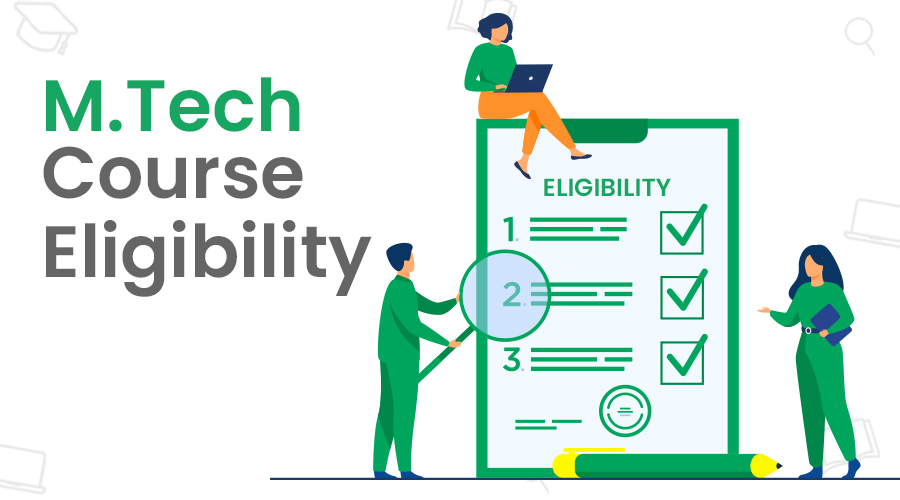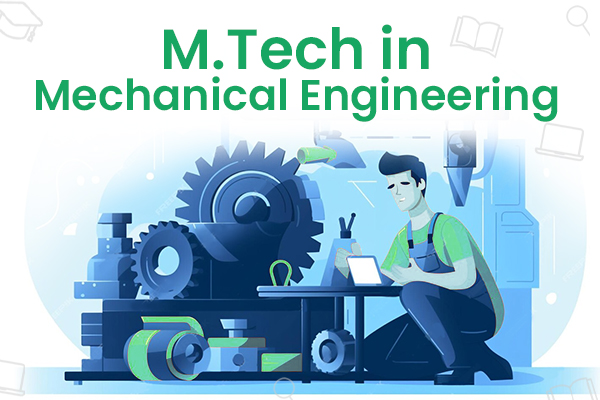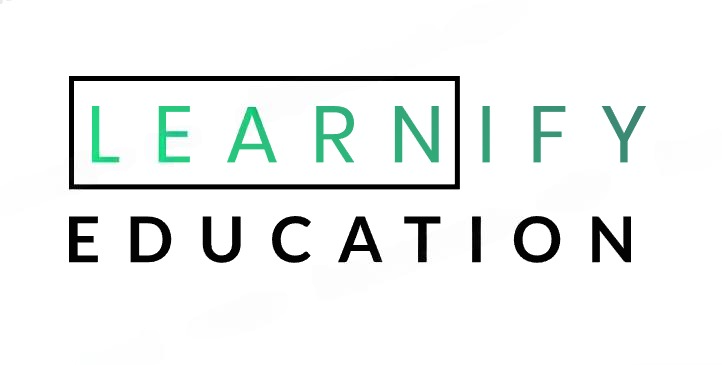Full-time M.Tech
Generally spans over 2 years, consisting of 4 semesters.













M.Tech (Master of Technology) is a postgraduate program designed to provide advanced education and training in various engineering and technology fields. Typically lasting 2 years full-time, with part-time options for working professionals, it offers specializations like Computer Science, Mechanical Engineering, Civil Engineering, Electrical Engineering, Biotechnology, and Cyber Security. The curriculum blends advanced theoretical knowledge with practical applications, including core subjects, electives, project work, and seminars. Pursuing M.Tech enhances career prospects by deepening technical expertise, opening opportunities for higher-level roles, engaging in research, and fostering professional growth through industry connections.
| College Name | Course | Eligibility Criteria |
|---|---|---|
| IIT Madras | Part-Time M.Tech | B.E./B.Tech. in relevant discipline, minimum 2 years of work experience |
| IIT Hyderabad | Executive M.Tech | B.E./B.Tech. in relevant discipline, minimum 2 years of work experience |
| Indian Institute of Science (IISc) | M.Tech. for Working Professionals | B.E./B.Tech. in relevant discipline, minimum 2 years of work experience |
| IIT Delhi | Part-Time M.Tech | B.E./B.Tech. in relevant discipline, minimum 2 years of work experience |
| IIT Gandhinagar | M.Tech. for Working Professionals | B.E./B.Tech. in relevant discipline, minimum 2 years of work experience |
| BITS Pilani | Work Integrated Learning Program (WILP) M.Tech | B.E./B.Tech. in relevant discipline, minimum 1 year of work experience |
| Semester | Core Subjects | Electives | Project/Thesis |
|---|---|---|---|
| 1 | Advanced Engineering Mathematics | Machine Learning | |
| 1 | Advanced Algorithms | Cloud Computing | |
| 1 | Data Structures | Internet of Things (IoT) | |
| 2 | Network Security | Big Data Analytics | |
| 2 | Advanced Computer Architecture | Cyber Security | |
| 2 | Software Engineering | Artificial Intelligence | |
| 3 | Research Methodology | Blockchain Technology | |
| 3 | Electromagnetic Theory (for Electrical Specializations) | Robotics | |
| 3 | Finite Element Analysis (for Mechanical Specializations) | Renewable Energy Systems | |
| 4 | Thesis/Dissertation | Elective 1 | Major Project/Thesis |
| 4 | Industrial Training/Internship | Elective 2 | |
| 4 | Seminar and Technical Writing | Elective 3 |

| Entrance Exam | Conducting Body | Exam Frequency | Eligibility Criteria | Key Features |
|---|---|---|---|---|
| GATE | IITs and IISc | Annually | Bachelor's degree in Engineering/Technology | Accepted by most engineering colleges, focuses on in-depth technical knowledge |
| BITS HD | Birla Institute of Technology and Science | Annually | Bachelor's degree in Engineering/Technology | Specific to BITS Pilani campuses |
| TANCET | Anna University | Annually | Bachelor's degree in Engineering/Technology | Specific to colleges in Tamil Nadu |
| VITMEE | VIT University | Annually | Bachelor's degree in Engineering/Technology | Specific to VIT University campuses |
| SRMJEEE-PG | SRM University | Annually | Bachelor's degree in Engineering/Technology | Specific to SRM University |
| IIITH PGEE | IIIT Hyderabad | Annually | Bachelor's degree in Engineering/Technology | Specific to IIIT Hyderabad |
| PGET | Various State Universities | Annually | Bachelor's degree in Engineering/Technology | State-level entrance exams |
| IPU CET | Guru Gobind Singh Indraprastha University | Annually | Bachelor's degree in Engineering/Technology | Specific to GGSIPU |
| CUCET | Central Universities | Annually | Bachelor's degree in Engineering/Technology | Central Universities entrance exam |
| AP PGECET | Andhra Pradesh State Council of Higher Education | Annually | Bachelor's degree in Engineering/Technology | Specific to colleges in Andhra Pradesh |
| Specialization | Description | Key Career Opportunities |
|---|---|---|
| Computer Science & Engineering | Focuses on advanced computing, software development, and algorithms | Software Engineer, Data Scientist, AI Specialist |
| Mechanical Engineering | Covers advanced concepts in mechanics, thermodynamics, and material science | Mechanical Engineer, Project Manager, R&D Engineer |
| Electrical Engineering | Involves the advanced study of electrical systems, electronics, and power engineering | Electrical Engineer, Power Systems Engineer |
| Civil Engineering | Focuses on advanced structural engineering, construction management, and urban planning | Structural Engineer, Construction Manager |
| Biotechnology | Deals with advanced techniques in biotechnology, genetic engineering, and bioinformatics | Biotechnologist, Research Scientist |
| Cyber Security | Specializes in protecting systems, networks, and data from cyber attacks | Cyber Security Analyst, Information Security Manager |
| Artificial Intelligence & Machine Learning | Focuses on developing intelligent systems and machine learning algorithms | AI Engineer, Machine Learning Specialist |
| Data Science | Involves extracting insights from large datasets using statistical and computational techniques | Data Analyst, Data Scientist |
| Robotics | Covers the design, construction, and operation of robots and automated systems | Robotics Engineer, Automation Specialist |
| Renewable Energy | Focuses on sustainable energy solutions and technologies | Renewable Energy Consultant, Solar Energy Engineer |

Software Engineer
Develops and maintains software applications.
Mechanical Engineer
Designs and oversees the production of mechanical systems.
Electrical Engineer
Works on electrical systems, electronics, and power generation
Civil Engineer
Manages construction projects and urban planning.
Cyber Security Analyst:
Protects organizations from cyber threats and attacks.
AI/Machine Learning Specialist
Develops AI algorithms and machine learning models
Biotechnologist
Conducts research in biotechnology and genetic engineering.
Research Scientist
Conducts research in various scientific fields.
R&D Engineer:
Develops new technologies and products.
Project Manager
Manages engineering projects from inception to completion.
Construction Manager:
Oversees construction projects and ensures timely delivery.
Management Consultant
Provides expert advice on business strategies and operations
Technical Consultant
Offers specialized technical advice to businesses and organizations.
Lecturer / Professor
Teaches at universities and conducts research in academia.
Startup Founder
Establishes and manages technology-driven startups.
Public Sector Jobs
Opportunities in government organizations and public sector undertakings related to engineering and technology.
Ph.D.
Pursue doctoral studies for careers in research and academia.

The duration of M.Tech courses typically varies based on the mode of study and institution:
Full-time M.Tech
Generally spans over 2 years, consisting of 4 semesters.
Part-time M.Tech
Typically extends over 3 to 4 years, allowing working professionals to study while continuing their careers.
Distance M.Tech
Similar to part-time, spanning 3 to 4 years, with flexibility in study timings and mode.
The exact duration may vary slightly depending on the specialization and curriculum structure of the specific M.Tech program offered by different universities and institutes.

M.Tech in Biotechnology focuses on advanced studies in biological sciences, emphasizing applications in various industries such as pharmaceuticals, healthcare, agriculture, and environmental management. This specialization integrates principles of biology, chemistry, genetics, and bioinformatics to develop innovative solutions and products. Graduates of M.Tech in Biotechnology can pursue careers as biotechnologists, research scientists, bioinformatics specialists, and regulatory affairs managers. The curriculum typically includes courses in genetic engineering, molecular biology, bioinformatics, bioprocess engineering, and biostatistics, preparing students for roles at the forefront of scientific research and technological innovation in biotechnology.
| College Name | Location | Specializations Offered | Website |
|---|---|---|---|
| International Institute of Information Technology (IIIT) Hyderabad | Gachibowli | Computer Science, Electronics, VLSI Design | IIIT Hyderabad |
| Jawaharlal Nehru Technological University (JNTU) | Kukatpally | Civil Engineering, Mechanical Engineering, Electrical Engineering | JNTU Hyderabad |
| University College of Engineering, Osmania University | Osmania University Campus | Computer Science, Civil Engineering, Electrical Engineering | Osmania University |
| Gokaraju Rangaraju Institute of Engineering and Technology | Bachupally | Computer Science, Electronics, Electrical Engineering | GRIET |
| Maturi Venkata Subba Rao Engineering College (MVSR) | Nadergul | Mechanical Engineering, Electrical Engineering, Electronics | MVSR Engineering College |
The syllabus for M.Tech in Computer Science and Engineering (CSE) typically includes a blend of core subjects, electives, and practical projects. Below is a general outline of the syllabus:
Note: The specific syllabus may vary between universities and institutes offering M.Tech in CSE. Elective courses allow students to specialize further based on their interests in areas such as data science, machine learning, cybersecurity, and more.

M.Tech in Aeronautical Engineering focuses on advanced studies in aerospace engineering, covering aerodynamics, propulsion systems, aircraft structures, materials science, and flight mechanics. Graduates pursue careers as aircraft design engineers, flight test engineers, aerospace systems engineers, and researchers in industries and research institutions. Key topics include aerodynamics, propulsion, aircraft structures, materials science, and avionics, preparing students for roles in aircraft design, space technology, and academic research.

M.Tech in Mechanical Engineering is an advanced program focusing on mechanics, thermodynamics, materials science, and design optimization. It prepares graduates for careers in mechanical design, manufacturing, research, and consulting across various industries. Key highlights include advanced manufacturing processes, robotics, energy systems, and opportunities at prestigious institutions like IITs and NITs.
| Aspect | Description |
|---|---|
| Mode of Study | Distance Learning |
| Flexibility | Study while working; self-paced learning |
| Delivery Methods | Online lectures, study materials, periodic contact sessions |
| Curriculum | Similar to traditional M.Tech programs, adapted for distance education |
| Examinations | Conducted online or at designated centers |
| Support System | Online forums, webinars, academic counseling |
| Benefits | Career advancement, accessibility, cost-effectiveness |
| Institutions | IGNOU, Sikkim Manipal University, Anna University (Centre for Distance Education), BITS Pilani (WILP) |
Focus
Advanced study in cybersecurity principles, techniques, and tools.
Curriculum
Includes network security, cryptography, ethical hacking, cyber forensics, and security management.
Skills
Develops expertise in securing digital systems and responding to cyber threats.
Career Paths
Prepares for roles like cybersecurity analyst, consultant, and manager.
Institutions
Offered at universities like IIT Kanpur, IIIT Bangalore, Amity University, and Lovely Professional University.
| Institution | Indian Institute of Technology Roorkee |
|---|---|
| Programs Offered | M.Tech in Civil, Mechanical, Electrical, Computer Science, and more |
| Curriculum | Advanced coursework, research projects, industry collaborations |
| Faculty | Expert faculty with extensive experience |
| Facilities | State-of-the-art labs and research facilities |
| Specializations | Diverse engineering disciplines |
| Research Focus | Emphasis on research and innovation |
| Placement | Strong industry connections leading to excellent placements |
| Admission Process | Entrance via GATE scores, eligibility criteria, and interviews |
| Global Recognition | Internationally recognized programs attracting global students |
| Institution | Indian Institute of Technology Kanpur |
|---|---|
| Programs Offered | M.Tech in Aerospace Engineering, Biological Sciences & Bioengineering, Chemical Engineering, Civil Engineering, Computer Science and Engineering, Electrical Engineering, Environmental Engineering & Management, Industrial and Management Engineering, Materials Science and Engineering, Mechanical Engineering, Nuclear Engineering, Photonics Science and Engineering, and more |
| Curriculum | Advanced coursework, research projects, industry collaborations |
| Faculty | Renowned faculty with expertise in their fields |
| Facilities | State-of-the-art laboratories and research facilities |
| Specializations | Wide range across engineering and interdisciplinary fields |
| Research Focus | Strong emphasis on research and innovation |
| Placement | Excellent placement record with top companies |
| Admission Process | Admission through GATE scores followed by interviews |
| Global Recognition | Internationally recognized programs attracting global talent |
Yes, M.Tech (Master of Technology) is typically pursued after completing a Bachelor's degree in Engineering (B.E.) or a related field.
M.Tech programs usually take two years to complete if pursued full-time. Part-time or distance learning options may extend the duration.
M. Tech stands for Master of Technology, a postgraduate academic degree conferred after completing a specialized course of study in engineering or technology fields.












